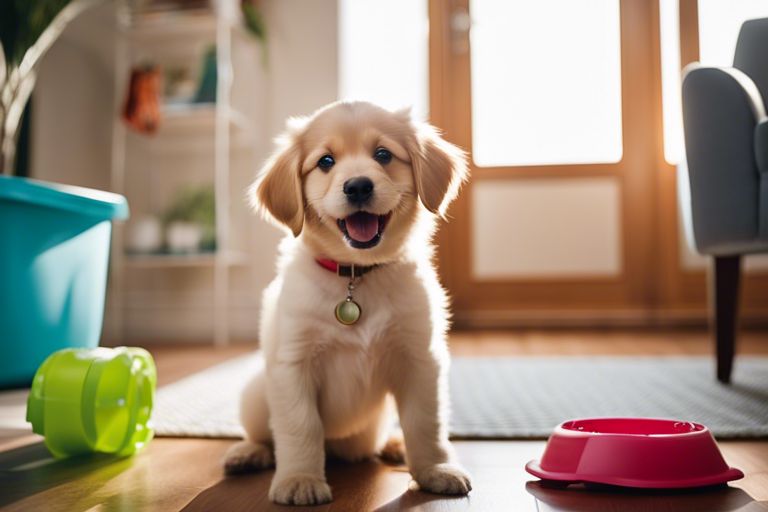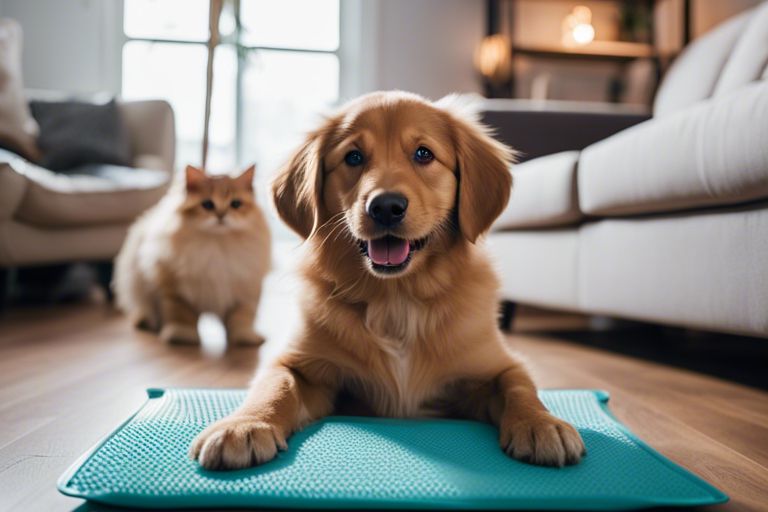Puppy potty training can be overwhelming, but with the right approach and consistency, you can teach your furry friend good bathroom habits. In this comprehensive guide, we will cover everything you need to know to successfully housebreak your puppy. From creating a routine to positive reinforcement techniques, we have got you covered. Say goodbye to accidents inside the house and hello to a well-trained pup!
Key Takeaways:
- Consistency is key: Establish a routine for your puppy’s potty breaks, feeding times, and sleeping schedule. Consistent training will help your puppy learn faster.
- Use positive reinforcement: Reward your puppy with treats, praise, and affection when they go potty in the designated area. Positive reinforcement will encourage good behavior.
- Be patient and persistent: Potty training takes time and effort. Stay patient and persistent, and do not get discouraged by setbacks. With time and consistency, your puppy will learn to be housebroken.
Understanding Your Puppy’s Needs
While housebreaking a puppy may seem like a daunting task, understanding your puppy’s needs is a crucial first step in the process. Puppies have small bladders and may not have full control over their bladder and bowel movements until they are several months old. This means that they will need to go potty frequently, especially after eating, drinking, playing, or waking up from a nap.
Factors Affecting Housebreaking Success
- Consistency in routine
- Positive reinforcement
- Puppy’s age and breed
Though these factors can affect the success of housebreaking, with patience and persistence, you can help your puppy learn where and when it is appropriate to potty.
Identifying Your Puppy’s Learning Style
On the journey to successfully housebreaking your puppy, it is important to understand how they learn best. Affecting your puppy’s learning style are factors such as their personality, energy levels, and response to training methods. By identifying these traits, you can tailor your approach to potty training to fit your puppy’s specific needs.
Identifying your puppy’s learning style will help you determine if they respond better to treats, praise, playtime, or a combination of these rewards. By observing your puppy’s behavior and reactions during training sessions, you can gauge what motivates them and adjust your training methods accordingly.

Preparing for Housebreaking
Essential Supplies and Equipment
Supplies such as puppy pads, cleaning products specifically designed for pet stains, a leash and collar, and treats for positive reinforcement are necessary for successful housebreaking. Additionally, having a designated area for your puppy to eliminate, whether it be a specific spot in the yard or a puppy pad indoors, is crucial for training consistency.
Creating a Puppy-Friendly Environment
Now is the time to puppy-proof your home to prevent accidents and set your furry friend up for success. Remove any potential hazards or items that your puppy could chew on or ingest. Consider using baby gates to restrict access to certain areas of the house until your puppy is fully housebroken.
Creating a safe and comfortable environment for your puppy will not only help with housebreaking but also ensure that your new furry friend feels secure and happy in their new home.
Establishing a Routine
There’s no substitute for consistency when it comes to housebreaking your puppy. Establishing a routine for feeding, potty breaks, playtime, and bedtime will help your puppy understand what is expected of them. Take your puppy outside or to their designated potty area first thing in the morning, after meals, after naps, and before bedtime.
This predictability will help your puppy learn when and where they are supposed to go potty, making the housebreaking process much smoother for both of you.
How to Potty Train Your Puppy
Choosing the Right Potty Training Method
Despite the numerous methods available for potty training your puppy, it is imperative to choose one that aligns with your puppy’s personality and your lifestyle. Training your puppy to go potty outdoors using positive reinforcement such as treats and praise can be effective for some dogs. Others may respond better to crate training, where they are confined in a crate when unsupervised and taken outside immediately after. Consistency and patience are key regardless of the method you choose.
Tips for Effective Communication
Training your puppy to communicate their need to go potty is crucial for successful potty training. Establishing a designated potty area in your yard can help your puppy recognize where they should go. Use verbal commands such as “go potty” or “do your business” consistently to signal when it’s potty time. Additionally, paying attention to your puppy’s body language, such as circling or sniffing, can help you anticipate when they need to go out.
- Use consistent verbal cues to associate with potty time.
- Pay attention to your puppy’s body language for signs that they need to go out.
Even though accidents are bound to happen during the potty training process, it’s imperative not to scold or punish your puppy. Any negative reinforcement can create confusion and hinder progress in their training.
Managing Accidents and Setbacks
On the journey to successfully potty training your puppy, there may be accidents and setbacks along the way. It’s crucial to stay patient and consistent in your training efforts. Reacting with an understanding attitude and cleaning up accidents promptly with an enzymatic cleaner can help prevent repeat incidents.
Plus, creating a routine for potty breaks and rewarding your puppy for successful trips outdoors can reinforce positive potty habits.
Establishing Good Habits
Scheduling Regular Potty Breaks
For your puppy to successfully learn where and when to go potty, it’s crucial to establish a consistent routine. Set specific times throughout the day for potty breaks, such as first thing in the morning, after meals, before bedtime, and every few hours in between. Make sure to take your puppy outside to the designated potty area each time to reinforce the behavior.
Rewarding Good Behavior
Potty training can be a challenging task, but positive reinforcement goes a long way in teaching your puppy the right habits. When your puppy goes potty in the designated area, immediately praise and reward them with treats or verbal praise. Consistency in rewarding good behavior will help your puppy make the connection between going potty in the right spot and receiving a reward.
Rewarding good behavior is an imperative part of potty training. Your puppy will be more motivated to continue the desired behavior if they associate it with positive reinforcement. Make sure to praise and reward your puppy consistently each time they go potty in the designated area.
Consistency is Key
Consistency is crucial in housebreaking your puppy. Make sure everyone in the household follows the same potty training schedule and reinforces the same rules. Any deviations from the routine can confuse your puppy and set back the training progress. It’s important to be patient and remain consistent in your approach to help your puppy develop good potty habits.
Consistency is key to successful potty training. Establishing a routine and consistently reinforcing good behavior will help your puppy understand what is expected of them. With patience and dedication to consistent training, your puppy will learn to potty in the right place and avoid accidents inside the house.
Overcoming Common Challenges
Dealing with Separation Anxiety
After bringing a new puppy home, separation anxiety can be a common challenge during the housebreaking process. Puppies can become anxious when left alone, leading to accidents in the house. To address this issue, it’s important to gradually acclimate your puppy to being alone. Start by leaving them alone for short periods and gradually increasing the time as they become more comfortable.
Managing Distractions and Interruptions
The key to successfully potty training your puppy is consistency, but distractions and interruptions can make this challenging. The best way to handle this is by creating a designated potty area and minimizing distractions during potty breaks. Establishing a routine and sticking to it can help your puppy focus and understand when and where they are supposed to go potty.
With some patience and consistent training, you can help your puppy overcome distractions and interruptions, leading to a successful housebreaking experience.
Coping with Inclement Weather
Any pet owner knows that dealing with inclement weather can pose a challenge when housebreaking a puppy. Rain, snow, or extreme temperatures may discourage your puppy from going outside to potty. To tackle this, consider setting up a sheltered potty area or investing in puppy-friendly indoor alternatives such as potty pads or artificial grass patches.
Weather should not be a deterrent in your housebreaking journey. By finding solutions to cope with inclement weather, you can ensure that your puppy remains on track with their potty training even when the weather is less than ideal.
Advanced Housebreaking Techniques
- Using Crate Training to Your Advantage
- Implementing Gradual Freedom
| Benefits | Tips |
| Provides a safe space for your puppy | Choose a crate that is just big enough for your puppy to stand up, turn around, and lie down comfortably |
| Helps establish a routine | Use the crate for short periods initially and gradually increase the time spent in it |
With a structured schedule in place, gradually allow your puppy more freedom around the house. Start by giving them access to one room at a time and gradually expand their roaming area as they demonstrate good potty habits.
The Implementing Gradual Freedom
The key to success is to monitor your puppy closely during this process and be ready to go back a step if accidents occur. By slowly increasing their freedom, you help reinforce positive behaviors and set them up for success.
Troubleshooting Persistent Issues
You may encounter challenges even after implementing advanced housebreaking techniques. Common issues include regression in potty training, territorial marking, or anxiety-related accidents.
You can address these problems by revisiting the basics of housebreaking and reinforcing positive behaviors. Also, consult with a veterinarian or professional dog trainer for additional guidance.
Issues
If problems persist, it’s imperative to remain patient and consistent in your training efforts. Remember that housebreaking takes time and dedication, but with the right approach, you can help your puppy become a well-trained and well-behaved member of your household.
Summing up
Now that you have learned the basics of potty training your puppy, remember that consistency and positive reinforcement are key. Stay patient and consistent with your training methods, and always reward good behavior. Remember that accidents will happen, but with time and practice, your puppy will learn where it is appropriate to go potty.
By following the tips and techniques outlined in this guide, you can successfully housebreak your puppy and create a happy, healthy environment for both you and your new furry friend. With dedication and a positive attitude, you can teach your puppy good habits that will last a lifetime.
FAQ
Q: Why is potty training important for puppies?
A: Potty training is important for puppies to establish good habits early on, prevent accidents in the house, and create a clean and comfortable environment for both the puppy and the owner.
Q: What are some tips for successful potty training?
A: Some tips for successful potty training include establishing a routine, using positive reinforcement, supervising the puppy closely, and being patient and consistent with training.
Q: How long does it usually take to potty train a puppy?
A: The time it takes to potty train a puppy can vary depending on the breed, age, and individual personality of the puppy. On average, it can take anywhere from a few weeks to a few months to fully potty train a puppy.

